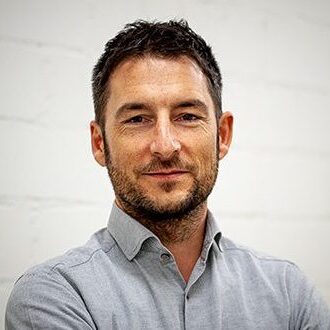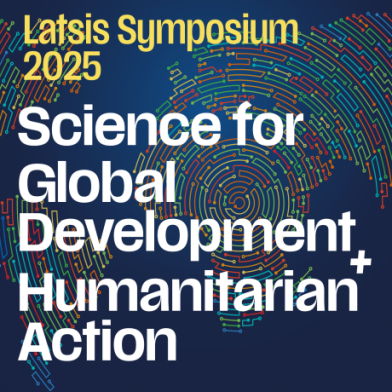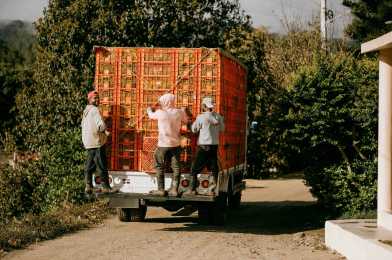News & Events
Pure quantum state without the need for cooling

Even large objects with several hundred million atoms can exhibit quantum mechanical behaviour – without cooling and at room temperature, as researchers at ETH Zurich have shown. This yields exciting potential for new technologies.
A Patch for the Heart

A new type of tissue-engineered cardiac patch could not only seal defective areas of the heart, as has been the case up to now, but also heal them. An interdisciplinary team led by ETH Zurich has successfully implanted the patch in animals.
Left-handed or right-handed? Nanostructures identified by light

How do left-handed and right-handed molecules differ? Researchers at ETH Zurich are using a new imaging method to visualise what was previously only measurable as an average, opening up new possibilities for biology and materials science.
Do you want to freeze a cloud? Desert dust might help

Dust particles from deserts promote ice formation in clouds. This discovery highlights the importance of aerosols for understanding cloud behaviour, predicting precipitation, and assessing the role of clouds in climate change.
A fully liquid Earth’s core also generates a magnetic field

For more than 100 years, scientists have puzzled over whether the Earth’s magnetic field had already been generated stably back in its early days when its inner core was fully liquid – unlike it is today. A team of geophysicists has used a simulation to show that this was highly likely.
Doctoral defense of Paul Tautorat

Paul Tautorat has successfully defended his PhD thesis.
Why nationalists hardly ever anticipate nationalist retaliation

Nationalism is surging at an alarming rate in many parts of the world. Conflict researcher Lars-Erik Cederman explains the paradoxical impact of nationalists’ repeated underestimation of the nationalism of others. This could also hold true in the attack on Iran.
Syria in transition: Recovery, security, rights

What comes after Assad – and under what conditions can Syria transition towards the rule of law and economic recovery? In his latest CSS Analysis, CSS Senior Researcher Emanuel Schäublin examines the current situation in Syria and explores what groundwork must be laid for a sustainable transformation in the post-Assad era.
Before Vegas: The “Red Hackers” Who Shaped China’s Cyber Ecosystem

This CSS Cyberdefense report by Eugenio Benincasa examines how a core group of red hackers from the 1990s and 2000s laid the groundwork for China’s modern cyber capabilities and traces their trajectories from early red hacker groups into professional cybersecurity roles.
China’s Vision for Science and Technology

China’s growing capabilities in science and technology have raised concerns about global power balances. In his CSS Analysis, Leo Eigner describes how, as geopolitical tensions increase, China is doubling down on its long-term vision of scientific and technological 'self-reliance' to transform itself into a technosecurity state.
Ringvorlesung Herbstsemester 2025
«Das Judentum und die Künste». Der Start der Ringvorlesung ist am 15. September 2025
On equal terms with the CTO

Students at ETH Zurich are teaming up with engineers from industrial companies to help expedite innovation. This unique approach to teaching and collaboration has been hailed by both sides as a great success.
Gold Standards: Do Certification Schemes Deliver Transparency to Consumers?

Certification schemes for gold are designed to encourage responsible sourcing and increase transparency across the supply chain. But how effective are they in practice?
The new space age could thin the ozone layer

The rapid rise in global rocket launches could slow the recovery of the vital ozone layer, says Sandro Vattioni. The problem is being underestimated – yet it could be mitigated by forward-looking, coordinated action.
Podcast: Agroecology – Rethinking Agriculture

In conversation with Fritz Brugger, Fabio Leippert explains how agroecology differs from conventional and organic farming, and why it must be seen as more than a label – as a system rooted in ecological principles, social justice, and local knowledge.
What makes debris flows dangerous

Time and again debris flows cause death and destruction. A research team has measured these flows of water, earth and debris with high precision. The study shows previously unexplained factors that determine the destructive force of debris flows – which allows appropriate protective measures to be put in place.
Science Fiction Lecture 2025
mit Prof. Dr. Eva Horn am 24. Oktober 2025 um 18:15 Uhr im AudiMax der ETH Zürich.
“Those who store carbon have a social responsibility”

Pioneer Fellow Edoardo Pezzulli is developing software that makes it possible to continuously monitor carbon storage in the ground and reduce its risks. Now he is striving to bring his technology to market.
A clear plan for security

ETH professor Ueli Maurer has provided cryptography with a theoretical basis. Now he is retiring. However, his most important research project is yet to come.
Eight professors appointed

At its meeting of 9 and 10 July 2025 and upon application of Joël Mesot, President of ETH Zurich, the ETH Board appointed eight professors. The Board also awarded the title of "Professor of Practice" once.
Eight Years of Service for ETH

The Vice President Knowledge Transfer and Corporate Relations, Vanessa Wood, will step down from the ETH Executive Board effective December 2025. She looks back at her leadership roles within ETH and on the successful establishment of the new Vice Presidency.
Over 400 different types of nerve cell have been grown – far more than ever before

For the first time, researchers at ETH Zurich have successfully produced hundreds of different types of nerve cell from human stem cells in Petri dishes. In the future, it will thus be possible to investigate neurological disorders using cell cultures instead of animal testing.
Latsis Symposium 2025: Science for Global Development and Humanitarian Action

Hosted by ETH for Development (ETH4D), the Latsis symposium in September will focus on key areas such as sustainable infrastructure, health innovation, climate adaptation, and AI-driven solutions in humanitarian contexts.
CSS in the BABS Magazine 24/25

The Center for Security Studies (CSS) and the studies of the Risk and Resilience Team are featured in the current Magazine of the Federal Office for Civil Protection FOCP.
A language model built for the public good

ETH Zurich and EPFL will release a large language model (LLM) developed on public infrastructure. Trained on the “Alps” supercomputer at the Swiss National Supercomputing Centre (CSCS), the new LLM marks a milestone in open-source AI and multilingual excellence.
The Jörg G. Bucherer-Foundation donates 100 million Swiss francs to ETH Zurich for Earth observation centre

ETH Zurich will receive 10 million Swiss francs a year from the Jörg G. Bucherer-Foundation for the next ten years. The university will use the funds to establish a competence centre for Earth observation with global appeal and a physical presence in the Canton of Lucerne. The Canton of Lucerne is to support the project as infrastructure partner.
New models improve predictions of snow, rock and ice avalanches

A new 3D simulation tool developed by ETH and SLF researchers now allows for significantly more accurate predictions of complex alpine mass movements, supporting alpine risk management.
Energy Security for Defense Capability

In the current debate surrounding defense capability, both energy security and climate change play a secondary role. In his new CSS analysis, Leonard Schliesser explains why increasing the energy independence of armed forces makes sense militarily, environmentally, and economically. It reduces dependence on imports, relieves the burden on logistics, cuts CO2 emissions, and bolsters resilience.
The New Arithmetic of Alliance

In her analysis, Gorana Grgić takes stock of the NATO Summit in The Hague. She highlights how the 5 per cent of GDP agreement on defense spending reflects a conceptual shift in burden-sharing and points toward greater European defense autonomy, but also faces major implementation challenges.
Intelligent wound dressing controls inflammation

Chronic wounds are a major medical challenge, burdening healthcare systems with billions of dollars in costs every year. Pioneer Fellow Börte Emiroglu is developing a new product: a selective, sponge-like hydrogel that reduces inflammatory signals and actively promotes healing.
Does densification lead to more heat stress in cities?

High temperatures and more frequent heatwaves are causing many people to doubt whether high-density urban planning is still sustainable. However, building physicist Jan Carmeliet argues that even dense cities can be cool if they are planned correctly.
Making fibrosis visible – before it’s too late

Giuseppe Antoniazzi is developing a diagnostic toolkit that gives early warning of fibrotic diseases. In doing so, this Pioneer Fellow wishes to contribute to the early detection of tissue scarring, which is usually noticed too late and can barely be halted, and enable countermeasures to be implemented.
A map for single-atom catalysts

Using nuclear magnetic resonance, researchers at ETH Zurich have studied the atomic environments of single platinum atoms in solid supports as well as their spatial orientation. In the future, this method can be used to optimize the production of single-atom catalysts.
Elaborate search for a new force

Scientists are using trapped ions in experiments to search for signs of a new particle that could help explain the mysterious dark matter. Researchers at ETH Zurich are combining their results with findings from teams in Germany and Australia.
A driving force in medicine

Christian Wolfrum has played a key role in the evolution of medical research at ETH Zurich. Now he’s taking on a new challenge in Singapore.
Young Scholar Recognition awarded to Margaritha Windisch (CLE/ETH Zurich) at ESELS Conference 2025
Margaritha Windisch, Ph.D. candidate at ETH’s Center for Law & Economics (CLE), reached 2nd place in the Young Scholar Recognition at the European Society for Empirical Legal Studies (ESELS) Conference 2025 in Toulouse.
ETH NADEL Course on Food Security: How to Measure and Improve

This course enhances participants’ understanding of the challenges low- and middle-income countries face in achieving food security. It focuses on measurement tools and intervention design in different contexts.
Award for space researcher Thomas Zurbuchen

The ETH professor has received one of the most prestigious awards in space research. According to the laudation, Thomas Zurbuchen has distinguished himself by his contributions to the aerospace community.
ETH Alumni: Jeannine Pilloud hands over to Ruedi Hofer

Following the resignation of the ETH Alumni Association Board of Directors, outgoing President Jeannine Pilloud looks back on the last two years and explains where the Association stands today.
How urea forms spontaneously

Urea is considered a possible key molecule in the origin of life. ETH researchers have discovered a previously unknown way in which this building block can form spontaneously on aqueous surfaces without the need for any additional energy.
Fighting blackouts with mathematics

Florian Dörfler develops algorithms that keep our power grids stable using mathematics and, as he says, a strong willingness to take risks. He has now been awarded the Rössler Prize, the most prestigious honour for young professors at ETH Zurich.
Building breast tissue in the lab to better understand lactation

Researchers at ETH Zurich are developing a model in the lab made from human breast milk cells. They hope it will help them understand how breast milk is made – a little-researched area of female biology.
ETH spin-offs sweep the board at Venture Awards

Six spin-offs of ETH Zurich were among the 18 finalists in this year’s Venture Awards. Three of them won in their respective categories, and three came in second. The Grand Prize went to spin-off MyNerva.
“Vertical extensions of buildings are becoming a key option for urban redevelopment”

Why are more new housing units being constructed in Geneva each year, while Zurich is seeing a decline? Why are older residential buildings in Basel, Geneva and Lausanne being vertically extended, while they are being demolished and replaced in Zurich? ETH researchers provide new answers to the role of housing construction and its social impact.
Learning from each other

Knowledge grows through dialogue: we learn by explaining and understand by listening. ETH helps facilitate this process – in continuing education, in vocational training and at the science-policy interface.
A building material that lives and stores carbon

Researchers are developing a living material that actively extracts carbon dioxide from the atmosphere. Photosynthetic cyanobacteria grow inside it, forming biomass and solid minerals and thus binding CO2 in two different manners.
QS rankings: ETH Zurich secures 7th place once again

According to the recently published QS World University Rankings 2026, ETH Zurich ranks among the world’s ten best universities once again this year. It took the top spot in continental Europe, with only universities in the US and the United Kingdom ranking higher.
Specialists for sustainable industry in sub-Saharan Africa

ETH Zurich has set up a master's programme in mechatronics in collaboration with Ashesi University in Ghana. The first cohort of students is now graduating. The project aims to contribute to sustainable industrialisation in sub-Saharan Africa.

